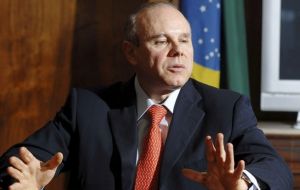MercoPress. South Atlantic News Agency
Brazil not satisfied with IMF capitalization proposals
 Mantega rejects IMF comments about Brazilean banks
Mantega rejects IMF comments about Brazilean banks Brazil and other emerging economies are willing to provide additional financing to the International Monetary Fund but they are still not happy with the capitalization mechanism proposed by the institution, Finance Minister Guido Mantega said on Thursday.
The IMF is working on a plan to issue bonds to emerging countries that have offered to capitalize the institution, but the preliminary proposal presented by the board of the fund “still does not satisfy our demands” Mantega told reporters in Washington, where he was attending the IMF/World Bank meetings.
“We still have to improve this instrument,” he said, adding that emerging countries such as Brazil and China will not make additional contributions to the fund while the new mechanism is not ready.
The minister stressed that Brazil would still make good on its pledge to contribute with as much as 4.5 billion US dollars to become a member of IMF financial transaction plan, or the mechanism through which the IMF finances its loan operations.
But the additional pledge of 10 billion USD made by the country during a G20 meeting earlier this month would depend on the definition of that mechanism.
The G20 agreed to boost the IMF firepower earlier this month through the so-called new agreement to borrow, or NAB, an emergency facility that allows member countries to provide credit to the fund in case of severe crisis.
But Mantega said emerging countries are not happy about how the NAB was structured because it reflects the imbalances of current IMF voting power, which is dominated by rich nations.
He also called on the IMF to speed up a plan to issue 250 billion in special drawing rights, SDR to member countries, saying that would provide liquidity for nations to fight the global crisis.
Despite praising the IMF for its recently unveiled flexible credit line, which allows well-run emerging economies to borrow money without conditionalities, Mantega was much more critical about the fund's assessment of current economic conditions.
According to the minister, the Brazilian economy will still expand this year, and not contract 1.3% as forecast by the IMF.
“The Brazilian economy is already recovering from that sharp economic slowdown seen last year,” he said. ”We are closer to the economic conditions of China and India than to (the conditions of) the United States or Germany.“
Mantega also disputed recent comments from IMF Managing Director Dominique Strauss-Kahn, who told Latin American newspapers that banks in Latin America could eventually hold toxic assets if the economic crisis lasts much longer.
”Brazilian banks are solid and will post profits in 2009“ he said, adding that comments like that can hurt investor confidence.
”If you don't get this straight right away, one can imagine that he has information that others don't. But he doesn't have more information than I do. I know deeply the Brazilian banks and I can say they are completely sound“.
Strauss-Kahn in an interview with Brazil's Valor Economico newspaper warned that if the current financial and economic woes continue, Latin American banks, which have so far been immune, might start to have problems.
”If the slowdown of the (global) economy continues for a long time, even Latin American banks will have toxic assets,” Strauss-Kahn said in the Valor interview.




Top Comments
Disclaimer & comment rulesCommenting for this story is now closed.
If you have a Facebook account, become a fan and comment on our Facebook Page!